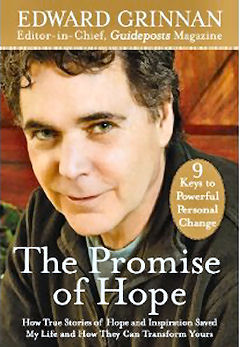
|
Posted June 14, 2011
Book: The Promise of Hope: How True Stories of Hope and Inspiration Saved My Life and How They Can Transform Yours Author: Edward Grinnan Ideals Publications. Nashville, TN. 2011. pp. 278 An Excerpt from the Jacket:
In his never-before-told story, Grinnan describes his incredible road back from the abyss to the day he walked into Guideposts, looking for a job. . .any job. It was the unexpected beginning of a career, and now, after years of helping hundreds of people tell their own incredible stories of hope and inspiration, Grinnan reveals the essential qualities that are universal to spiritual growth, the nine keys to powerful personal change: honesty, willingness, imagination, commitment, faith, forgiveness, acceptance, resilience and love. An Excerpt from the Book: Honesty Biologically, we never stop changing. The molecules we wake up with are different from the molecules we went to sleep with. Hair grows and falls out, blood-sugar levels fluctuate. My fingernails lengthened slightly as I typed this. One of the first scientific factoids I remember hearing was that our bodies undergo a complete cellular makeover every seven years, roughly the time it takes for the billions and billions of cells that constitute our corporeal being to turn over. So how come, my innocent middle-school mind wondered at the time, we aren’t completely different people at each septennial juncture? Ah! Said my science teacher, that’ because our DNA stabilizes this process. Biological change is “process change” --- change we have little or no control over. Nature just takes care of it, as it does the turning of the seasons and the rotation of the earth on its polar axis. The kind of change I’m talking about, the kind that begins with honesty, is the kind we take care of (or not). Transformational change. What part of us, exactly, are we changing when we engage in transformational change? Does it mean becoming less of what we are and more of something we want to be? A better version of ourselves, or a completely different person altogether? Most of us tend to view our personal changes a little like nature’s changes --- as something that happens in our external world: we get a big promotion; we gain thirty pounds in the years after our kids are born; a loved one dies, and so on. But change at its most basic level is how we react to what happens to us in life, not the event itself. The big promotion or gaining thirty pounds or losing a loved one are what happens, but they’re not change --- not really. Positive change occurs when you do something about your exciting new responsibilities or those unhealthy pounds or your paralyzing grief. We ran a contest at the magazine recently called “New Year, New You,” in which we offered a total, yearlong mind/body/spirit makeover with four of our personal empowerment experts to the person who told the most compelling story about why she or he wanted to change. We had thousands of entrants and, as you might expect, many wanted to change the external things people usually seek to change --- weight, health, fitness, career, finances, relationships. Yet more than all of those, there was one thing that people most wanted to change. Negative thinking. Now, these were not unhappy people. Most were solid members of their communities, worked hard, went to church, and took care of their families. Good people. Yet, they were beset by negative thoughts --- doubts, guilt, envy, resentment, worry and putting themselves down. A veritable epidemic of negative thinking. And negative thinking can only lead to negative results. Who could hope to change any of those other problems, from body-image issues to finances, if they didn’t first address a change in their negative thought process? Then I thought about myself, the editor-in-chief of a magazine rooted in positive thinking. Was I so free of these attitudinal encumbrances? No. I worry and complicate situations that should be simple. I fear that bad events will only get worse, and I wonder if good events might have a tarnished lining. I seem to have a capacity for giving myself a hard time and draining my life of the positive change that is there for me, the joy and satisfaction each of us is meant to experience and that are the keys to a happy life. Which brings me back to the matter of honesty, and why it’s the first indispensable prerequisite in transformational personal change. Unless we are willing to honestly recognize and admit a problem --- unless we address our attitude before anything else --- we have virtually no hope of changing beyond being struck by lightning on the road to Damascus, and few of us will ever hit that particular spiritual jackpot (thought later in the book I will tell you about a couple who did). Most of us are honest people. But being honest with ourselves is hard. It is not a perfect process. In fact, self-honesty can be a very messy business. There is no one easier to lie to than yourself. People who would never lie to their children or their friends have no compunction about deceiving themselves. We justify our faults and disappointments by blaming others or circumstances we believe we can’t control. We think it is a shortcoming to admit unhappiness. We say we’re not angry and resentful when we know we are, for fear that we’ll be thought of negatively or even denied love. We say that we have strong faith, yet we mistrust the future. And maybe it’s the bathroom scale that’s five pounds over, not me. We don’t just hide from tough truths. We also hide from our true desires and dreams, afraid to admit what we yearn for from life. Table of Contents: 1. Honesty 2. Willingness 3. Imagination 4. Commitment 5. Faith 6. Forgiveness 7. Acceptance 8. Resilience 9. Love |
|
